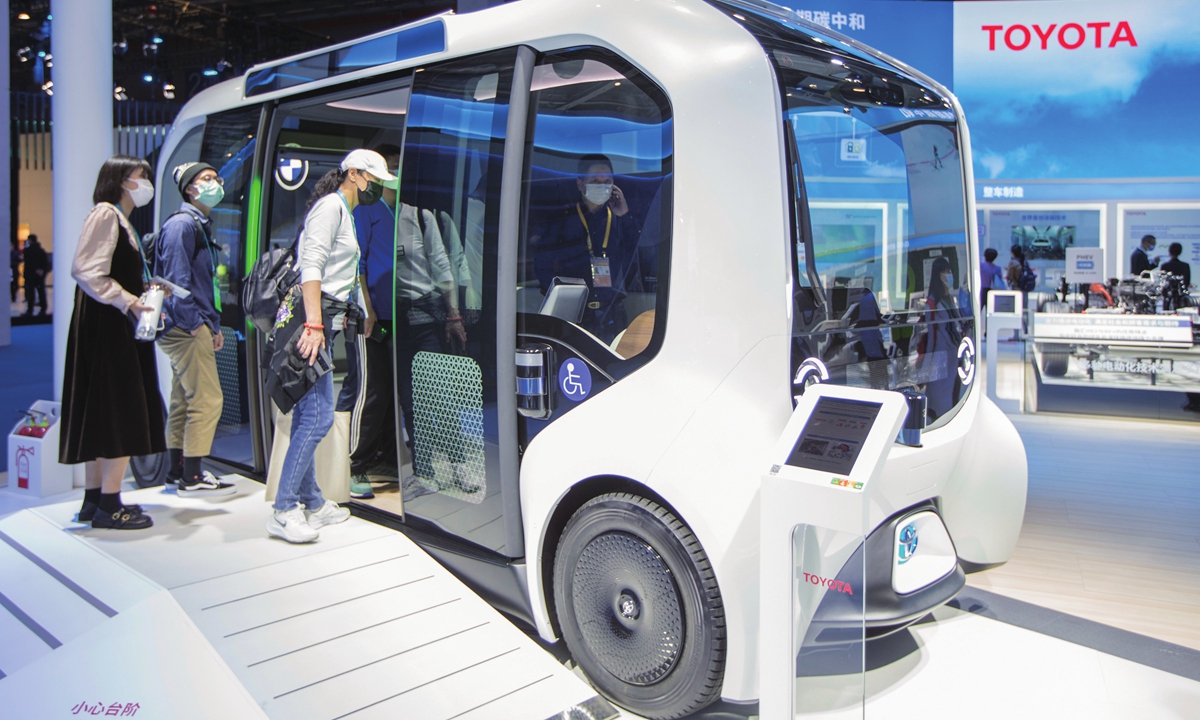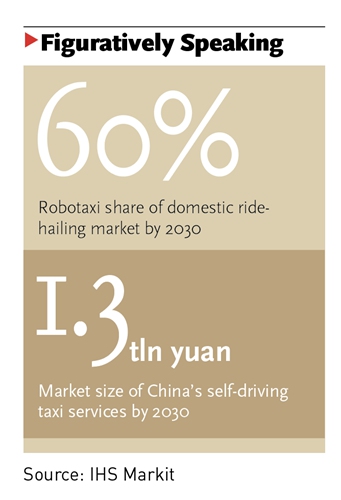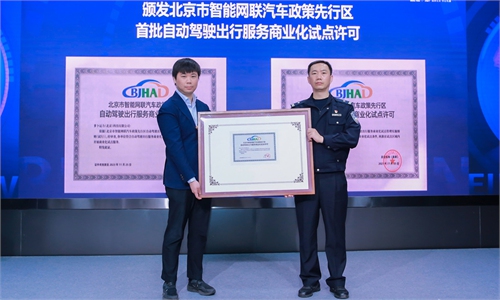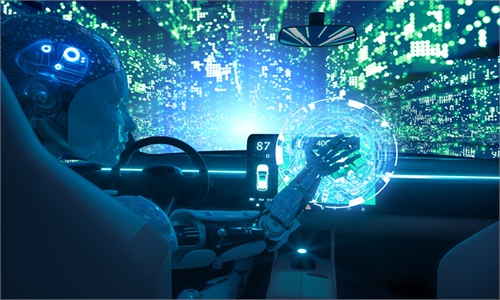China’s autonomous driving enters fast lane, boosted by NEV growth and favorable policies
NEV advantage, updated regulation give industry a push

A view of Toyota's self-driving vehicle exhibited at the China International Import Expo in November 2021 Photo: cnsphoto
The ravaging COVID-19 pandemic has disrupted many sectors across the global economy, posing multiple challenges to enterprises and their manufacturing capacity. But there is one sector that has remained unaffected, witnessing record new development over the past two years: autonomous driving.
China has redoubled efforts within the autonomous driving sector: issuing regulations and policies that will facilitate the development of the industry, and supporting self-driving car developers to undertake more testing.
In a fresh move, Shanghai authorities rolled out a range of measures to promote the development of self-driving technology in 2022 including the acceleration of commercialization: supporting firms like Baidu and AutoX to speed up pilot programs for Robotaxi (autonomous taxi) services in the city's Jiading district, supporting trial operations of SAIC Yangshan Port intelligent heavy truck to achieve "reduction of human resources," and carrying out the exploration of new business models such as intelligent public transport, unmanned sanitation and unmanned distribution, according to a report by the Shanghai Securities on Monday.
Additionally, the city said it will support Pudong New Area's legislation on autonomous driving without in-car safety operators, marking new progress in the sector in terms of regulation and policy, experts said.
"It marked a breakthrough, and the proposal by a benchmark city like Shanghai will undoubtedly propel the industry's further development," Dai Yifan, assistant dean at the Suzhou Automotive Research Institute of Tsinghua University, told the Global Times on Tuesday.
But it needs to be stressed that autonomous vehicles without in-car safety operators do not mean that the cars can completely bypass safety operators. "Remote monitoring systems are always there," he said.
In August 2021, China revamped its regulations on driverless car testing, allowing qualified firms to conduct trials of autonomous vehicles used for transporting passengers and goods on highways and city roads, in an attempt to accelerate the commercialization of self-driving technology.
Driverless cars that are equipped with real-time remote monitoring systems and can record and store driving data for at least 90 seconds before any crash or system failure are eligible to apply for the trial.
A total of 27 provinces and municipalities in China have rolled out regulations on self-driving vehicles, establishing 16 autonomous driving demonstration zones, and opening more than 3,500 kilometers of test road, the Xinhua News Agency reported.
Commercialization quickens
China's self-driving car sector has seen explosive growth over the past two years, rising from a small sector, to an area receiving significant backing from both government and industry heavyweights, and giving rise to a class of start-ups who are seeking to monetize their technologies, hoping to be the first to get a viable product on the road.
Wu Gansha, chairman and CEO of Chinese self-driving start-up UISEE, told the Global Times on Tuesday that "commercialization" was the buzzword for the industry in 2021, and firms were all vying for a foothold.
"Companies that originally only focused on the Robotaxi market are now exploring other autonomous driving sub-scenarios, hoping to make up for the original single strategic layout," Wu said.
Robotaxis or delivery services are deemed as an ideal path in the sector for accumulating driving time and huge amount of data needed for cars to learn and maximize safety levels.
Chinese tech giant Baidu Inc and self-driving start-up Pony.ai in November won approval to launch paid driverless Robotaxi services in an area in Beijing's Yizhuang, where they have put no more than 100 autonomous vehicles into commercial use, marking a new stage in China's autonomous driving sector from testing and demonstration to commercialization pilot.

UISEE, which has been deploying full-scene autonomous driving from the very beginning, has accelerated its commercialization efforts in 2021, implementing autonomous driving technology in multiple scenarios including airports, industrial settings and unmanned buses.
By December 2021, the start-up's commercialized autonomous driving mileage had exceeded 1.2 million kilometers, data from the company showed, making it the first of its kind to cross this threshold in the world.
From driverless road sweepers, unmanned delivery vehicles that solve the "last mile" issues to unmanned vending machines in public spaces and driverless logistics vehicles operating at ports or airports, "China has taken a lead in the innovation of various scenario applications, and underlying technologies are also catching up quickly," Dai noted.
Companies engaged in this field, however, are still in a stage where investment exceeds output, Wu noted, adding that UISEE has been seeing a healthy pickup in orders and a start with large-scale commercialization of driverless vehicles could be seen since last year.
Meanwhile, Chinese self-driving developers are also actively exploring opportunities in overseas markets to export their technologies.
In January, a self-driving delivery vehicle equipped with UISEE autonomous driving system appears in Saudi Arabia to carry out the "last mile" commercial unmanned delivery service in the community of King Abdullah University of Science and Technology.

A self-driving delivery vehicle equipped with a UISEE autonomous driving system appears in Saudi Arabia to carry out the "last mile" commercial unmanned delivery service in the community of King Abdullah University of Science and Technology in January. Photo: Courtesy of UISEE
"Despite the pandemic, domestic companies have resumed normal operations due to effective prevention and control in China. At the same time, the demand for unmanned services in overseas markets has increased due to the impact of the pandemic, which provided more business opportunities for Chinese companies," said Wu.
Looking ahead, the autonomous driving sector is ready to take a major leap in 2022, experts and industry insiders claimed.
According to Dai, Chinese self-driving industry has consolidated significant momentum over the past year in catching up with the US, while the gap was still quite wide five years ago.
"Some leading international automakers we talked with told us that they feel both the EU and Japan developers are feeling hard to keep up with the pace of China's development in the autonomous driving sector," Dai noted.
With the help of China's rich experience in the new-energy vehicle (NEV) industry combined with the advantages in digitalization such as big data, the country could strive to take the lead in the sector, he added.



